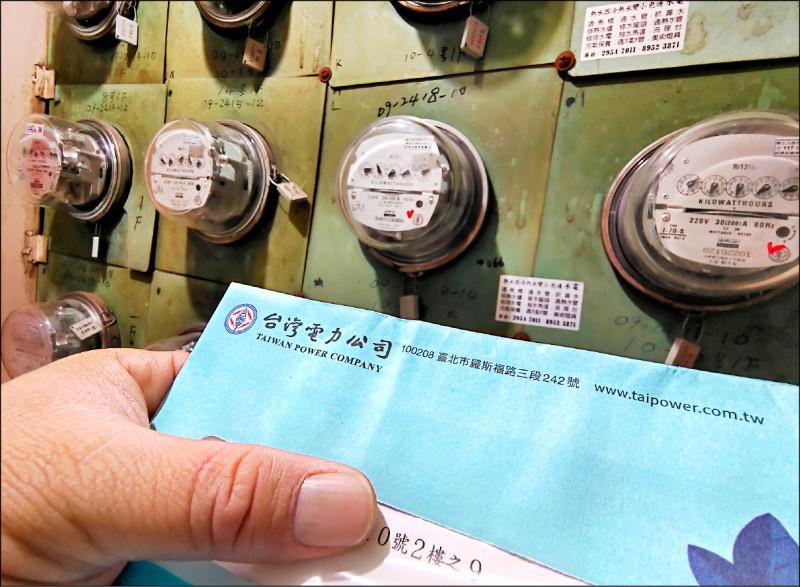A government-convened price review committee could approve Taiwan Power Co’s (Taipower) plan to increase electricity rates tomorrow, sources say.
The committee is set to meet tomorrow to decide next month’s electricity rate adjustments, although sources said that they could increase rates after a “buffer period.”
It has been reported that there could be three scenarios regarding electricity rates.

Photo: Taipei Times file photo
The first is an average rate increase of six percent; the second, a rate increase of under six percent to limit the effect on households; and the third, an increase that does not go into effect until July to give the Legislative Yuan time to decide on whether to provide the company with subsidies.
At a news conference today, Cabinet spokesperson Michelle Lee (李慧芝) said the question of electricity rates is subject to discussion by the price review committee.
The Executive Yuan proposed a NT$100-billion (US$3.02 billion) subsidy for Taipower on two separate occasions, last year May as well as this January.
The first proposed subsidy passed its preliminary review but is pending legislative approval, while the second proposal, included as part of the 2025 central government budget, was completely rejected by the Legislative Yuan.
The six- to eight-percent rate increase estimates all come from people outside the company, Taipower chairman Tseng Wen-sheng (曾文生) said.
The estimated rate increase does align with Taipower’s revenue and losses, Tseng added.
Adjusting electricity rates for households and industrial customers have different impacts on inflation, as the former directly increases the Consumer Price Index (CPI), a measure of inflation, while the latter is an indirect effect, Tseng said.
Keeping electricity rates below cost is unsustainable and slows progress on developing green energy solutions, the Taiwan Climate Action Network said, proposing three measures to alleviate the impact on the public.
Their proposed measures are implementing higher rate increases for heavy users, allocating tax revenue for energy-saving initiatives and slowing the rate increases to raise energy prices while not increasing the burden on households.
Additional reporting by Chen Chia-i

The manufacture of the remaining 28 M1A2T Abrams tanks Taiwan purchased from the US has recently been completed, and they are expected to be delivered within the next one to two months, a source said yesterday. The Ministry of National Defense is arranging cargo ships to transport the tanks to Taiwan as soon as possible, said the source, who is familiar with the matter. The estimated arrival time ranges from late this month to early next month, the source said. The 28 Abrams tanks make up the third and final batch of a total of 108 tanks, valued at about NT$40.5 billion

Two Taiwanese prosecutors were questioned by Chinese security personnel at their hotel during a trip to China’s Henan Province this month, the Mainland Affairs Council (MAC) said yesterday. The officers had personal information on the prosecutors, including “when they were assigned to their posts, their work locations and job titles,” MAC Deputy Minister and spokesman Liang Wen-chieh (梁文傑) said. On top of asking about their agencies and positions, the officers also questioned the prosecutors about the Cross-Strait Joint Crime-Fighting and Judicial Mutual Assistance Agreement, a pact that serves as the framework for Taiwan-China cooperation on combating crime and providing judicial assistance, Liang

A group from the Taiwanese Designers in Australia association yesterday represented Taiwan at the Midsumma Pride March in Melbourne. The march, held in the St. Kilda suburb, is the city’s largest LGBTQIA+ parade and the flagship event of the annual Midsumma Festival. It attracted more than 45,000 spectators who supported the 400 groups and 10,000 marchers that participated this year, the association said. Taiwanese Designers said they organized a team to march for Taiwan this year, joining politicians, government agencies, professionals and community organizations in showing support for LGBTQIA+ people and diverse communities. As the first country in Asia to legalize same-sex

MOTIVES QUESTIONED The PLA considers Xi’s policies toward Taiwan to be driven by personal considerations rather than military assessment, the Epoch Times reports Chinese President Xi Jinping’s (習近平) latest purge of the Chinese People’s Liberation Army (PLA) leadership might have been prompted by the military’s opposition to plans of invading Taiwan, the Epoch Times said. The Chinese military opposes waging war against Taiwan by a large consensus, putting it at odds with Xi’s vision, the Falun Gong-affiliated daily said in a report on Thursday, citing anonymous sources with insight into the PLA’s inner workings. The opposition is not the opinion of a few generals, but a widely shared view among the PLA cadre, the Epoch Times cited them as saying. “Chinese forces know full well that